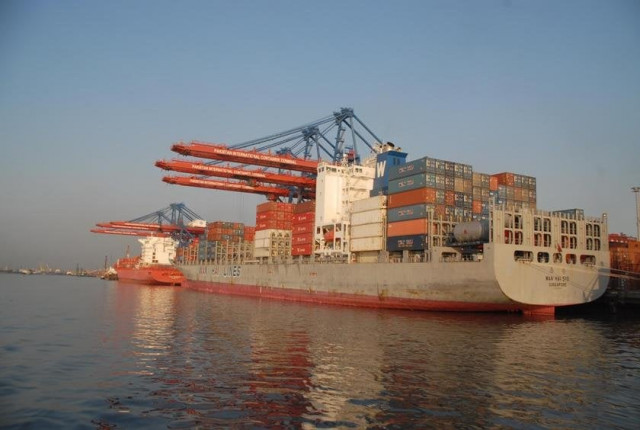Govt offers raft of incentives to boost shipping sector
New policy envisages various tax exemptions for 10 years, berthing preference to local ships

The government on Friday announced a new shipping policy aimed at boosting the maritime sector, cutting the country’s annual freight bill worth $5 billion and reducing reliance on the international shipping lines for trade.
Maritime Affairs Minister Ali Haider Zaidi told a joint press conference with Adviser to Prime Minister on Commerce and Investment Razak Dawood that the new policy would expand the maritime sector and earn foreign exchange for the country.
The new policy offers various incentives, including exemption from federal tax on the Pakistan resident ship-owning companies for 10 years, while the ships sailing under the Pakistani flag would be given preference in berthing at the country’s ports.
According to the new policy, imports by the shipping companies of small and large ships in Pakistan will be exempted from customs duty until 2030. The incomes from these ships until that period would also be exempted from sales tax and income tax.
Zaidi told the press conference that new Pakistan resident ship-owning companies would pay tax of $0.75 per gross register tonnage (GRT) for the first five years of the operations of each individual vessel, subject to the cut off period till 2030.
After five years, the minister said, Pakistan resident ship owning companies would pay $1 per GRT annually on the income from vessels’ operation. He added: “No federal tax will be levied to the detriment of Pakistan resident ship-owning companies during the exemption period.”
The minister said that vessels, under the Pakistani flag, would be provided priority berthing at all Pakistani ports, while no preference would be given to the Pakistan National Shipping Corporation (PNSC) in private sector cargo.
He said that the shipping companies could now take advantage of the liberal fiscal concessions and low mark-up rates offered by the State Bank of Pakistan (SBP) under its Long-Term Finance Facility (LTFF) to acquire ships, carrying the Pakistan flag.
“In the light of the shipping industry significance in overall economic development and foreign exchange savings, the shipping industry has been allowed to avail Long-Term Finance Facility (LTFF)/Islamic Long-Term Finance Facility (ILTFF),” the minister said.
Defining the Pakistan resident ship-owning company, the minister told a questioner that it would be a company which was registered with the Securities and Exchange Commission of Pakistan (SECP) and had its own seaworthy vessels registered under the Pakistani flag.
According to the minister both domestic and foreign investors could avail these facilities. The SBP would provide long-term financing facility for the purchase of cargo ships, he said. “This policy will also benefit the fishermen,” he added.
"This business-friendly policy will reduce the annual freight bill worth $5 billion of Pakistan. It will also generate employment opportunities for the seafarers and allied sectors. It is only possible due to the vision of Prime Minister Imran Khan, who has declared 2020 as the year of ‘Blue Economy’,” he said.
The minister said that shipping industry was vital as it operated during peace time as well as in emergencies and high risk. He added that it was the need of the hour to revive this industry as “we have lagged way behind our regional competitors” like Bangladesh.
Dawood also said that Pakistan’s shipping industry had lagged far behind. “We have no alternative in case of emergency,” he said. Giving a comparison with other regional countries, he said, the PNSC had 11 cargo ships, where as India had 842, Bangladesh 347, Sri Lanka 40 and Iran had 100 ships.
With input from APP



















COMMENTS
Comments are moderated and generally will be posted if they are on-topic and not abusive.
For more information, please see our Comments FAQ